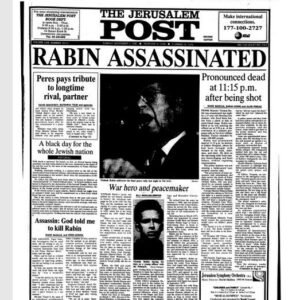By Andrew Adler
Community Editor

Front page of The Jerusalem Post telling of Israeli Prime Minister Yitzhak Rabin’s assassination on Nov. 4, 1995. (Credit: Jerusalem Post archive)
I don’t know what possessed me to turn on my TV on this particular Saturday afternoon. Maybe it was benign boredom, or perverse curiosity about what Donald J. Trump would be saying during a rally in small-town Pennsylvania. But there I was, peering at my 65-inch screen and suddenly realizing that somebody was trying to kill him.
Like many Americans, to say nothing of viewers living outside the U.S., I sat transfixed, watching replay after replay: the crackle of gunshots, Trump swatting at his ear as though a pesky mosquito had invaded his personal space, then crouching behind his podium while spectators screamed and Secret Service members attempted to hustle him to safety – face bloodied, instinctively defiant as he punched his fist into the summer air and mouthed the words, “Fight! Fight!”
I couldn’t help recalling another spasm of political violence: the moment I heard that Israeli Prime Minister Yitzhak Rabin had been assassinated. It was November 4, 1995 – also a Saturday – during which I was in my car approaching the intersection of Shelbyville Road and Hurstbourne Parkway, thinking about heaven knows what, when the news broke over the car radio. Rabin, a heroic military figure of 1967’s Six-Day War, had manged the extraordinary transition from ultimate hawk to a man willing to negotiate peace with his most infamous opponent. Who can forget his shaking hands – albeit reluctantly – with Yasser Arafat sealing the 1993 Oslo Accords in Washington, D.C., encouraged (some would say compelled) by President Bill Clinton, who stood beaming between them. Oslo, Camp David — these were manifestations of political figures willing to put aside any number of preconceptions in the name of seeking peace. Rabin famously said, “You don’t make peace with friends. You make it with unsavory enemies.” It was his willingness to leap across what was thought to be an unbridgeable chasm that reflected his genuine courageousness, and which prompted a gunman to wield a Beretta 84F semiautomatic pistol and pump two bullets into his back, wounding him fatally.
Political violence is endemic in America, and has been for centuries. Within minutes of the failed attempt on Trump’s life, personalities from Joe Biden on down (not to mention his counterparts in Europe and elsewhere) were declaring that such acts had no place in modern society – as though such platitudes would have any salutary effect. They are close cousins to the “thoughts and prayers” that follow these periodic eruptions of gunfire. We decry the easy access to guns of every description, while tacitly acknowledging that they are defining elements of American culture. Considering the intensity of extremist rhetoric that permeates our political apparatus, it’s almost a wonder that more acts of murderous mayhem don’t dance across our video displays.
Somehow, I hope that Israel would be less prone to such rhetoric. Nope. The far-right coalition that keeps Prime Minister Benjamin Netanyahu in power all too often acts as a conduit for the basest sort of behavior. Violent clashes between Israeli settlers and Arabs on the West Bank have become almost a routine adjunct to the more formalized post-October 7 conflict in Gaza.
I was still in my 30s when Rabin was assassinated – old enough to remember when Martin Luther King Jr. and Robert Kennedy were gunned down within months of each other in 1968. Indeed, I was six years old when John F. Kennedy was assassinated in Dallas on November 22, 1963, and I recall watching scenes of his funeral on the murky screen of our black-and-white TV. I had the naïveté of childhood in those years, relative innocence that dissipated with alarming sureness. The older I got, the more cynical I became. Today, in my mid 60s, that cynicism remains deeply rooted in myself, despite occasional efforts to banish it. Perhaps that’s why events like the murder of Rabin and the attempted murder of Trump are not all that surprising.
To a degree they reflect the pathology of disturbed individuals: Rabin’s assassin asked his interrogators for the opportunity to raise a glass in a toast to Rabin’s death. In Butler, Pennsylvania, the 20-year-old would-be assassin’s motives remain a cipher. They may never be known. All we can be sure of is that these outbreaks of hyper-severe violence are part of who we are, deeply rooted in our societal DNA. Try as we might to purge our collective selves of these destructive tendencies, we always seem to be setting ourselves up for failure.
I have yearned for Israel to do better. But these days those prospects are growing dimmer each day the present government remains in power. By the time you read this, Gaza war will be approaching its 300th day, with hostages still in captivity and the prospects for complete military success remaining elusive at best. Meanwhile, Saturdays continue to come and go, and with each of them I wonder if our complacency will again be shattered by a bullet on its path to yet another unsuspecting human being.
Andrew Adler is Managing Editor of Community



